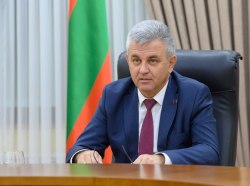Tiraspol, 9 March. /Novosti Pridnestrovya/. During a Supreme Council session the minister of economic development, Dmitry Boltrushko, responded to the inquiries by people's deputies Safonov Andrey and Vadim Kravchuk about the situation at Moldovan Steel Works (MMZ) and described the current situation at the plant.
The minster noted that MMZ paid off the December 2015 wages on 28 January 2016.
«This was due to a seasonal delay in cargo shipment and shortfalls in foreign trade payments. The arrears of wages had been liquidated as of 10 February 2016," explained Dmitry Boltrushko.
He also noted that MMZ has faced regular January-February stoppages of work since 2008 On 28 December MMZ launched a limited production regime due to reduction of scrap deliveries. Many workers had to take a 10-day unpaid leave in February, while others worked only part-time.
Dmitry Boltrushko explained that MMZ is an import-led enterprise and very dependent on foreign markets, Ukrainian markets in particular. It transpired at the beginning of the year that Ukraine was going to raise export duties on metal scrap from the current €30−50 per tonne for the period of three years, thus increasing its price several times. If Ukraine's export duty is 3.5 times as high, there will be no point in importing scrap form there with the current market prices as it will result in even greater losses for MMZ.
According to the minister, the plant's work in 2016 will depend on scrap deliveries and scrap prices, as well as external allocations at an amount of $10−12 million. Otherwise, Dmitry Boltrushko sums up, MMZ's performance will be under threat.
In the meantime, the government is working out proposals for granting assistance to the plant to prevent its stoppage and maintain production.
However, the authors of the inquiry were dissatisfied with a delay in the government's response and even filed a complaint to the prosecutor's office.
Deputy Vadim Kravchuk suggested that the MMZ management blackmails the government by saying «the state, not investors, needs the plant». He called the information provided by the Ministry of Economic Development a ploy as these facts are generally known, according to him. He believes «the current management cannot boast of the results of their work». At the same time, Kravchuk inquired about the details of borrowed loans and the person of the MMZ director general, Talgat Baytaziev.
The inquiry author urged the government to assess the MMZ's performance in the past year and check the repatriation of currency earnings. At the same time, MPs must hold a public hearing to obtain answers to their questions.
The co-author of the inquiry, deputy Andrey Safonov, was also dissatisfies with the minister's report. He was particularly interested in the whereabouts of the plant's director general, Talgat Baytaziev.
The minster, in turn, expressed astonishment at such a statement of the question.
«How can the information about the plant director's whereabouts help MPs work out specific decisions?» wondered Dmitry Boltrushko at an interview with journalists following the parliamentary session.
According to the minister, MMZ is receiving the government's assistance because, among other things, the plant employs about 2,500 workers. And many other enterprises are dependent on its production.
«The government is doing its best for the plant to maintain its work in this difficult period. And scandals brought up for public discussion by MPs do not favour assistance to the plant. No concrete proposal has ever followed deputies' inquiries," said Boltrushko.
«Seeing this considerable public excitement around Moldovan Steel Works, including at such a high level, contractors doubt the plant's performance," he explained.
Dmitry Boltrushko considers that deputies' inquiries «do not aim to monitor or support the plant», but rather to stir up excitement.
«We can hear only hearsay and scandals so far. I do not know how MPs can help besides criticising. At the moment deputies are arousing unnecessary excitement around this plant, which may damage its business reputation in such a difficult period," concluded the minister.








